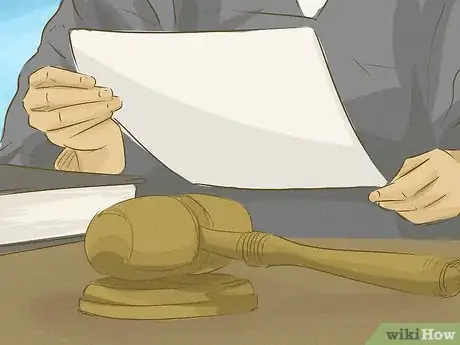This article was co-authored by Clinton M. Sandvick, JD, PhD. Clinton M. Sandvick worked as a civil litigator in California for over 7 years. He received his JD from the University of Wisconsin-Madison in 1998 and his PhD in American History from the University of Oregon in 2013.
There are 9 references cited in this article, which can be found at the bottom of the page.
This article has been viewed 14,598 times.
When you have a dispute with a business or another person, you might file a lawsuit in court. You also have the option to submit your dispute to arbitration. Arbitration is like a trial except a private person (the arbitrator) serves as the judge. In order to participate in arbitration, both sides must agree to submit the dispute to the arbitrator instead of to a court.
Steps
Hiring an Arbitrator
-
1Propose arbitration. Arbitration will allow you to resolve your dispute without going into court. In order to arbitrate the dispute, both parties must agree to the arbitration.[1] You can agree to arbitration in a couple of ways:
- Waive your right to bring a lawsuit in court. Often, when you sign a contract, there is a provision stating that all disputes will be handled in arbitration. These arbitration provisions are in a variety of contracts—cell phone contracts, cable TV contracts, etc. When you agree to the contract, you agree to arbitrate any dispute that arises. Courts will enforce these waivers, even if you signed it before any dispute arose.
- You can also call up your opponent and propose arbitration. Your opponent might have filed a lawsuit in court. You have the option of trying to get the other person to agree to arbitration.
- Sometimes, your state law will require arbitration. For example, in Oregon, any civil trial for less than $50,000 must be submitted to arbitration. In this situation, neither party has a choice about arbitrating. Your judge will tell you if you must arbitrate.
-
2Explain the advantages of arbitration. The other party might hesitate to arbitrate. In fact, the other person might not know what arbitration is. You should be prepared to explain the benefits of arbitration.
- Arbitration is private, whereas a lawsuit is public. If you sue each other in court, then anyone can access your court documents. Although you can have sensitive business information removed from court documents, this is a time-consuming process. You might appreciate the privacy of arbitration.
- Arbitration may be more convenient than a trial. In court, you need to work around the judge’s schedule. In arbitration, you have greater flexibility to work around your own schedule.
- Arbitration can sometimes be less expensive than a lawsuit, but this will depend on the amount the arbitrator charges.
- Arbitration moves faster than a trial in court. On average, a case can be arbitrated from start to finish in a little over a year. A court case can drag on for several years.[2]
Advertisement -
3Consider the disadvantages of arbitration. Arbitration does have some disadvantages, though these will differ depending on the circumstances. You should consider them before choosing arbitration:[3]
- You generally will have limited rights to challenge the decision of the arbitrator. Even if you think the arbitrator decided the case wrong, you will probably have to live with the decision.
- Also, if you are up against a big company, you might think that the arbitrator is not entirely fair. Many large companies use the same arbitrators over and over, so they may develop a familiarity. You might think the arbitrator will be biased in the company’s favor so that they will continue to be hired.
-
4Find an arbitrator. If you are in mandatory arbitration, then the court should refer you to a list of arbitrators that you can choose from. If you are engaged in voluntary arbitration, then you can find an arbitrator by contacting one of the national arbitration associations.
- The largest arbitration associations are the American Arbitration Association, the National Arbitration Forum, and JAMS. You can contact these organizations to find arbitrators.[4]
- You can also ask your lawyer for a recommendation for an arbitrator.[5] If you have used a lawyer in the past, such as to draft a will, then call up the lawyer. Ask for a referral.
-
5Check the price. Arbitration is rarely free, unless it is court ordered. Instead, arbitrator’s typically charge a fee based on the amount of money that is in dispute.
- For example, the large arbitration agencies typically charge $2,250 in fees to begin an arbitration in which $75,000 to $150,000 is in dispute.[6]
- Independent arbitrators might charge different amounts. For example, an independent arbitrator could charge $250 an hour or more for hearings and conferences. Many experienced arbitrators charge $3,000 a day.[7]
- If you can’t afford the arbitration fees, then you should go to small claims court instead. Small claims court is designed for people to represent themselves. It usually has a streamlined process, which allows cases to be resolved faster than in regular court.
-
6Sign an agreement. Before you begin arbitration, you will need to sign a contract. This contract will explain the arbitration process. It will also explain the rules that will govern the arbitration.[8]
- You and the other party have leeway about the rules that govern the dispute. For example, you could choose that the arbitrator apply the law the same way a judge in a court would.
- You might, however, not want to use your state’s rules of evidence. These rules limit the types of evidence you can introduce at the arbitration. You should talk to your lawyer about what rules you want to govern the arbitration.
- You also will agree as to whether the arbitration is binding or non-binding. If it is binding, then arbitration is like bringing a case in court. You will have to abide by the arbitrator’s decision. If you try to wriggle out from the decision, then the other party can take the arbitrator’s decision to court and get a court judgment against you.
Preparing for Arbitration
-
1Think about hiring an attorney. You can have a lawyer represent you in arbitration or you can proceed to arbitration on your own. You should hire a lawyer if you don’t feel comfortable representing yourself and if you can afford one.
- If the amount in dispute is $10,000 or less, then you might want to go ahead without an attorney. However, when the amount in dispute is $100,000 or more, than both parties usually have lawyers.[9]
- If your amount falls in between these two amounts, then there is no standard practice. Instead, you should choose to hire a lawyer if you would feel more comfortable. You also should consider the costs of a lawyer, which you will have to pay in addition to the cost of the arbitration.
- To find a lawyer, contact your local or state bar association. Get a referral for an attorney who handles the type of case that you are arbitrating. For example, if you are arbitrating a personal injury lawsuit, then you will want a lawyer with a background in personal injury.
- You can call the lawyer and ask if he or she has handled arbitration before. Although arbitration is similar to a trial, you still will want a lawyer who has had some experience handling arbitration.
-
2File documents. The person suing the other person files a “statement of claim.” This is like a “complaint” in a civil court lawsuit. It lays out a summary of the dispute and states what the person is seeking from the arbitrator (usually money).
- The defendant then files a “statement of response.” This is like an “answer” in a civil court trial. The defendant admits or denies each claim. The defendant may also bring counterclaims, which are your legal claims against the other person. For example, if someone sues you for injuries caused in a car accident, you could bring a counterclaim for the injuries they caused you in the same accident.
- Your lawyer can help you draft these documents. If you are proceeding without a lawyer, then the arbitrator may have samples you can use to help guide you in drafting your statements.
-
3Exchange documents. Each side can list the documents it has in its possession that relate to the dispute. The parties then can inspect each other’s documents and exchange them.
- You will also give copies of the documents to the arbitrator before the hearing so that he or she can look at them.
- The document exchange is similar to “discovery” in a civil lawsuit, where you and the other person can request documents from each other. However, document production and exchange in arbitration is typically more limited than discovery in litigation.[10] This is one of the ways that arbitration tends to be less expensive than a lawsuit in court.
-
4Attend prehearing conferences. You might have to attend short conferences in order to resolve different issues that come up before the arbitration hearing.
- For example, you might need to argue about whether it is appropriate for the arbitrator to hear and decide counterclaims.[11]
- You also might have a prehearing conference to exchange lists of witnesses you intend to call and a list of any documents you intend to use.
Participating in the Arbitration Hearing
-
1Present your side of the case. You will present evidence in arbitration much like you would in a court case. For example, you can submit documents and call witnesses to testify. Witnesses must be sworn in and testify under oath, just as they would in court.
- You will begin by delivering an opening statement. An opening statement is your chance to present the arbitrator with a roadmap for what evidence you will submit.
-
2Cross-examine witnesses. You or your lawyer can cross-examine the other side’s witnesses. The purpose of cross-examination is to undermine the witness’s credibility. You can do this in a couple ways:
- Show that the witness is biased. If the witness is related to your opponent, then you want to draw that fact out. You can also show that the witness will somehow benefit financially if your opponent wins. Uncovering bias shows the arbitrator that the witnesses has an incentive to shade the truth.
- Show inconsistencies in the witness’s story. The witness may have made statements in a court hearing which are inconsistent with what she is saying on the witness stand during arbitration. You can highlight these inconsistent statements.
-
3Make a legal submission. After all evidence has been presented, you might have to submit a summary of the evidence and the relevant law to the arbitrator. This will depend on the arbitrator. Some arbitrators will accept an oral legal submission, although others will want a written document.
- The arbitrator might also want this summary before the hearing instead of after all evidence has been submitted.
- A legal submission is like a trial brief. It should include an introduction, a summary of the factual background, and an explanation of how the facts relate to the law. You can see a sample trial brief by visiting the Department of Justice’s website at http://www.justice.gov/atr/case-document/trial-brief-united-states.
- Because trial briefs are complicated, you could agree ahead of time that you will only make an oral argument if you are representing yourself.
- If you draft a legal submission, then the arbitrator will tell you how to deliver it.
-
4Wait for the arbitrator’s decision. The arbitrator may issue an immediate oral ruling or take the issue under advisement and then issue a written ruling. Arbitrators will often explain their reasoning in a written arbitration decision.[12] Be sure to get a copy of the decision.
- If you win, it is still up to you to enforce the arbitration agreement. You can enforce the agreement through the courts.[13] You should go to court and tell the clerk that you want a judgment on your arbitration award. You will probably have to fill out a petition. The clerk can give you the form.
-
5Appeal, if allowed. You might have the right to appeal in arbitration. The right to appeal depends on whether you were engaged in voluntary or mandatory arbitration.
- Often, you can appeal if you were involved in mandatory arbitration. You must go to the courthouse and ask the court clerk for a form. Fill it out and file it.
- You typically cannot appeal a voluntary arbitration, although it is ultimately up to both parties whether or not they want to include the right to appeal. Usually people choose arbitration because there is no appeal process.
References
- ↑ http://adr.findlaw.com/arbitration/what-is-arbitration-.html
- ↑ http://www.nolo.com/legal-encyclopedia/arbitration-pros-cons-29807.html
- ↑ http://www.nolo.com/legal-encyclopedia/arbitration-pros-cons-29807.html
- ↑ http://www.nolo.com/legal-encyclopedia/arbitration-basics-29947.html
- ↑ https://www.freeadvice.com/legal/how-can-i-find-an-arbitrator/
- ↑ http://www.nolo.com/legal-encyclopedia/arbitration-basics-29947.html
- ↑ http://www.nolo.com/legal-encyclopedia/arbitration-basics-29947.html
- ↑ http://adr.findlaw.com/arbitration/what-is-arbitration-.html
- ↑ http://www.nolo.com/legal-encyclopedia/arbitration-basics-29947.html
- ↑ http://cnhlaw.com/arbitration/sample-arbitration-submission-agreement/
- ↑ http://www.nolo.com/legal-encyclopedia/arbitration-basics-29947-2.html
- ↑ http://www.nolo.com/legal-encyclopedia/arbitration-basics-29947-2.html
- ↑ http://www.wolfslatkin.com/Construction-Law-Briefs/The-ABCs-of-Arbitration-Part-C-Enforcement-of-Awards.shtml


















-Step-19.webp)
















-Step-19.webp)


































